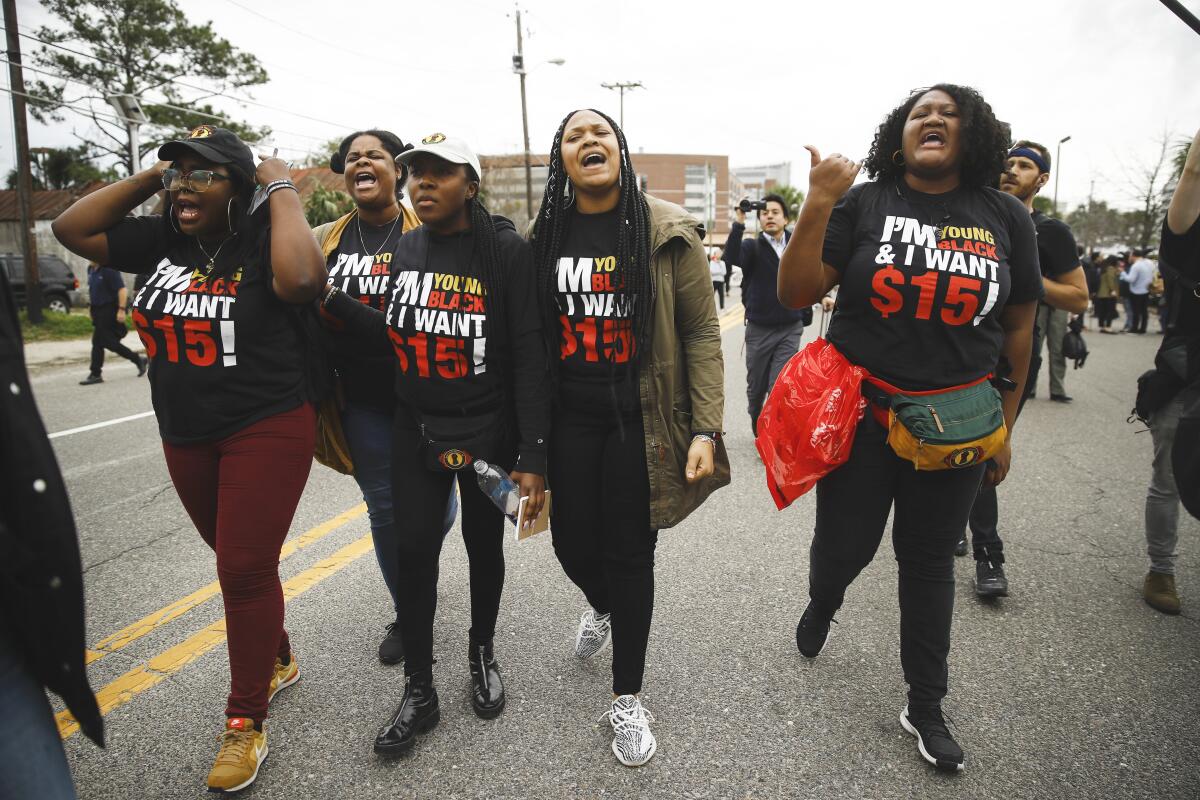America needs a $15 minimum wage

- Share via
At $7.25 an hour, the federal minimum wage is appallingly low.
It’s so low that a full-time worker making the federal minimum wage qualifies for food stamps, and a single parent working 40 hours a week falls below the poverty line. It’s hard to fathom how an adult could afford rent, food, transportation or a decent standard of living on the minimum wage salary of $15,000 a year, much less save money for a rainy day.
Yet an estimated 1.7 million workers across the U.S. are paid the federal minimum wage, which hasn’t been increased since 2009. These workers — along with other low-wage workers earning less than $15 an hour, who make up 20% of the nation’s workforce — are long overdue for a raise.
Congress is now debating whether to include President Biden’s proposal for a $15 minimum wage in the next COVID-19 relief package, while also eliminating the tip credit that allows restaurant workers in 43 states to be paid as little as $2.13 an hour. Lawmakers shouldn’t be swayed by naysayers and pessimists who argue that the pay hike is too much, too soon. Gradually raising the minimum wage to $15 will lift more working people out of poverty and help begin to reduce the yawning income inequality gap in this country.
While the federal minimum wage stagnated over the last decade, cities and states have raised their pay floor. Twenty-nine states and more than 40 cities have set base pay above $7.25. Many are already at $15 an hour or will get there in the next year or two, including Los Angeles and San Francisco, as well as the states of California and Massachusetts. And many have pegged future wage hikes to inflation so the pay floor will continue to rise.
Biden’s proposed hike is likely to lead some businesses to raise prices, increase automation or pare their payrolls. But that’s just half the picture. The Congressional Budget Office projected that the higher wage would raise the purchasing power of an estimated 27 million workers, lifting 900,000 out of poverty. That additional economic activity would boost the overall economy, at least temporarily.
How many jobs would be lost is a point of contention, and we’re not persuaded by the CBO’s projection that 1.4 million fewer people would be employed by the time the wage hike is fully implemented. Study after study has shown that the benefits of increasing the minimum wage outweigh the potential costs. The breadth of research has grown since 2000, when localities began passing wage hikes. A 2019 paper from the National Bureau of Economic Research analyzed 138 minimum wage changes between 1979 and 2016 and found that the “overall number of low-wage jobs remained essentially unchanged over five years following the increase.” Even when the pay hike was significant, there was not a sizable job loss.
But there are still 21 states with the minimum wage stuck at $7.25, including Texas, Pennsylvania, Tennessee and Wisconsin, far less than workers need to support themselves, according to MIT’s living wage calculator. The federal minimum wage is supposed to be the wage floor to ensure that a full-time worker can afford the cost of living. States can set it higher, but legislatures, bowing to politics and business lobbying, have often refused to boost pay for the lowest-paid workers. That’s why Congress needs to act.
The Raise the Wage Act would increase the minimum wage to $9.50 an hour in June. Then it would rise every year until it hits $15 in June 2025. After that, the minimum wage would increase annually with growth in the median wage. That’s important. Workers shouldn’t have to wait a decade or more for lawmakers to find the political will to raise the minimum wage. Guaranteeing that the minimum wage rises with inflation would help ensure that the lowest-paid workers don’t get left behind again.
There is considerable pushback to $15 an hour from lawmakers in low-cost states where the increase from $7.25 would be a considerable change. In Mississippi, a $15 minimum wage would give almost half of all workers a raise, the New York Times reported. Mississippi also has one of the highest poverty rates in the country.
Skeptics of minimum wage increases fixate on the potential job losses as reason not to embrace the $15 target. But Congress can — and should — enact tax policies and financial incentives to help employers, particularly small business, adjust to the pay mandate and help preserve jobs.
The U.S. cannot continue to ignore the working poor. We cannot deny the destructive effects of poverty and income inequality. Raising the minimum wage to $15 is not the answer to poverty, but it’s an important tool to begin to alleviate it.
More to Read
A cure for the common opinion
Get thought-provoking perspectives with our weekly newsletter.
You may occasionally receive promotional content from the Los Angeles Times.









